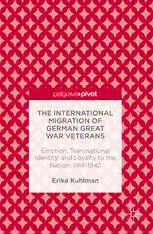
The International Migration of German Great War Veterans: Emotion, Transnational Identity, and Loyalty to the Nation, 1914-1942 PDF
Preview The International Migration of German Great War Veterans: Emotion, Transnational Identity, and Loyalty to the Nation, 1914-1942
THE INTERNATIONAL MIGRATION OF GERMAN GREAT WAR VETERANS Emotion, Transnational Identity, and Loyalty to the Nation, 1914-1942 Erika Kuhlman The International Migration of German Great War Veterans Erika Kuhlman The International Migration of German Great War Veterans Emotion, Transnational Identity, and Loyalty to the Nation, 1914–1942 Erika Kuhlman Idaho State University Pocatello, Idaho, USA ISBN 978-1-137-50156-1 ISBN 978-1-137-50160-8 (eBook) DOI 10.1057/978-1-137-50160-8 Library of Congress Control Number: 2016940878 © The Editor(s) (if applicable) and The Author(s) 2 016 This work is subject to copyright. All rights are solely and exclusively licensed by the Publisher, whether the whole or part of the material is concerned, specifi cally the rights of translation, reprinting, reuse of illustrations, recitation, broadcasting, reproduction on microfi lms or in any other physical way, and transmission or information storage and retrieval, electronic adaptation, computer software, or by similar or dissimilar methodology now known or hereafter developed. The use of general descriptive names, registered names, trademarks, service marks, etc. in this publication does not imply, even in the absence of a specifi c statement, that such names are exempt from the relevant protective laws and regulations and therefore free for general use. The publisher, the authors and the editors are safe to assume that the advice and information in this book are believed to be true and accurate at the date of publication. Neither the pub- lisher nor the authors or the editors give a warranty, express or implied, with respect to the material contained herein or for any errors or omissions that may have been made. Printed on acid-free paper This Palgrave Macmillan imprint is published by Springer Nature The registered company is Nature America Inc. New York A E K LSO BY RIKA UHLMAN Petticoats and White Feathers: Gender Conformity, Race, the Progressive Peace Movement, and the Debate over War, 1895–1919 Reconstructing Patriarchy after the Great War: Women, Gender, and Postwar Reconciliation among Nations Of Little Comfort: War Widows, Fallen Soldiers, and the Remaking of the Nation after the Great War v A CKNOWLEDGMENT I would like to thank the many people who helped make this book possible. Idaho State University’s College of Arts and Letters generously supported my research by awarding me with a sabbatical and course release time. The Interlibrary Loan department at Oboler Library helped me secure many of the sources I used to support this study. Christian Wilbers told me about the letter collection at the Sächsisches Staatsarchiv in Dresden: thank you again. It was Frank Trommler who pointed me in Wilbers’s direction to begin with. Thank you to the First World War Studies listserv participants, one of whom alerted me to the fact that Bruno Richard Hauptmann was indeed a soldier in the German Army during the First World War. Thanks to archivist Mark Falzini at the New Jersey State Police Museum, who seemed genuinely excited to hear that someone was interested in Hauptmann for a different reason. Finally, a big thank you to Kristine Hunt, who drew the map used to illustrate this volume. vii C ONTENTS 1 Introduction 1 2 The Weapons They Carried: Brutality and Veterans’ Memories of the First World War 2 1 3 Desertion: Emigrants’ Wartime Mobility, Their Transnational War Experience, and the Myths of War 45 4 Emigration, National Loyalty and Identity, and Anti-Semitism During the Weimar Republic and Nazi Germany 69 Epilogue 9 9 Index 1 13 ix
